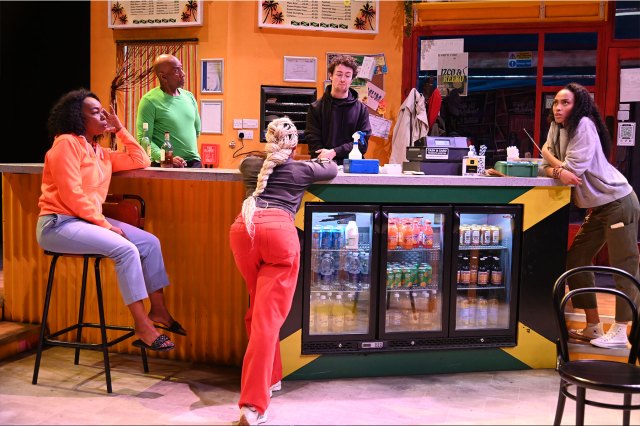
What would be your first order as the new creative director of a theatre? For the Liverpool Everyman’s Nathan Powell, the first play he’s chosen to program is his own. At first, it looks, promisingly, like the risk will pay off with a zinging, vibrant production. Jalapeño green, turmeric yellow and paprika red run through the Jamaican takeaway restaurant designed by Georgia Wilmot. The play itself, however, lacks a depth of flavour.
The premise is almost identical to Tyrell Williams’ Red Pitch. A local community (in Liverpool, in this case) has learned that developers plan to build apartments on football pitches. Where Williams kept his focus closely on the teenagers who use the pitches, Powell’s play is set in this nearby restaurant, leaving the significance of the pitches to the community unexplored.
Powell also treats themes and messages like seasoning, as if reading a menu for a sociopolitical drama. Terms like gentrification and generational trauma are dropped and dusted over the play without being stirred into it and meaningfully unpacked. Co-owner Shelly is told by her mother that she’s a Black woman who doesn’t understand her own racial identity. The mother Carol is resistant to Shelly’s white boyfriend, Richard, because she disagrees with interracial relationships, though again this isn’t developed.
Carol and Chef continually correct Shelly’s description of the protestors from “rioting” to “uprising”, but Powell’s play only breaks these words down by dropping names like Malcolm X and the Black Panthers. Likewise, by way of reflecting the local community, Powell’s script superficially name-checks Crosby, the “hipster” Baltic Market and Toxteth (“Tocky”); it could be any city outside the shop’s doors. Powell wrote the play before he moved to Liverpool, where he’s now lived for seven years, and you feel it could be feasibly transplanted to any city with a few swapped names.
We are simply told that the locals love the shop, but we never meet the customers through whom we might learn a sense of their attachment and dependence on it as a pillar of the community. The shop is also never at risk of the redevelopment, so the family and setting feel removed.

Instead, we get a circular argument – the mum’s stubborn silence over the business’s funding struggles, clashing intractably with the daughter’s brusque pushiness over how to rescue it – replayed in every scene. It’s not helped by Phina Oruche’s performance as Carol, lacking presence and command, appearing indifferent rather than proud of the shop. She appears stonily impassive, aloof and half-alert, never conveying much fight for her late husband’s business.
The play doesn’t just hop around these issues, it also rattles back and forth between the personal family drama and the protest backdrop. Arguments feel simply and thinly laid out, and it even spells out its own analogy between the developers tearing the community apart like the mum with her family.
Local radio snippets, which play in scene transitions, are cleverly used to track the rippling fallout as the protest escalates. And there is humour in Powell’s script, such as Chef’s horror at competitors selling patties for four pounds: “Did you get insurance on it too?”. Other lines, however, are more hackneyed and mawkish, such as “Adults need parents too” and Chef telling the younger daughter that she needs to “live your one life” instead of trying to make other people happy.
Wayne Rollins’ Chef is good comic value, though, with a mischievous playfulness as he tries to tease or defuse the family’s tensions, although his storyline around pursuing his talent by entering a cooking competition is abandoned. Bill Caple’s well-meaning Richard, meanwhile, nicely shows how not being fully accepted into the family affords him the greatest vantage point to observe and help mend its cracks. The dynamics feel authentic with the fractious chippiness and the tough matriarch. It’s just a shame that Powell is so keen to give us things to take away, he ends up leaving us with little substance to savour.















